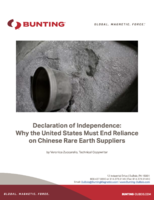Space Industrial Base is being challenged from 3 fronts.
Press Release Summary:
Marion Blakey, AIA President and CEO, said that a shrinking aerospace workforce, outdated export control rules, and a cumbersome defense acquisition system are threatening the health of the U.S. national security space industrial base. Recommendations to improve this situation solicited investment in science and education national priorities, re-evaluation of export controls on space technologies, and embracing of management practices that promote requirements stability.
Original Press Release:
National Security Space Industrial Base Challenged from Three Fronts
Arlington, Va. - A shrinking aerospace workforce, outdated export control rules and a cumbersome defense acquisition system all threaten the health of the U.S. national security space industrial base, AIA President and CEO Marion Blakey said Thursday.
"The role of space in our security and economy is critical," Blakey said in testimony to the House Strategic Forces Subcommittee. "Space systems provide everything from high-fidelity intelligence on terrorists in the tribal regions of Pakistan to global positioning system information to millions of Americans."
Changes to U.S. export control law nearly a dozen years ago transferred commercial satellites to the U.S. munitions list with a devastating result: the U.S. share of the export market dipped from about 70 percent in 1995 to 25 percent in 2005. Adding more strain, more than 60 percent of the workforce today is 45 or older according to recent surveys.
Blakey pointed to the defense acquisition system as another critical challenge. While lauding the formation of the Joint Space Cost Council, which originated in 2006 as an AIA-government initiative, she acknowledged that defense acquisition needs more far-reaching changes.
"Budget and program stability along with solid cost estimating are the building blocks of world-class acquisition," said Blakey. "To achieve that goal will require a renewed partnership between the Defense Department, Congress and our industry."
AIA recommendations to improve the space industrial base include:
The text of Blakey's remarks can be found on the AIA Web site at http://www.aia-aerospace.org/newsroom/speeches_testimony/
Founded in 1919, the Aerospace Industries Association represents the nation's leading manufacturers and suppliers of civil, military, and business aircraft, helicopters, unmanned aerial systems, space systems, aircraft engines, materiel, and related components, equipment services, and information technology.




